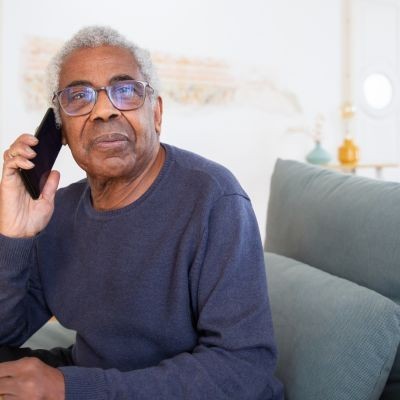
Head of Online Medical Content

Audiology Expert at Hearing Aid UK

Keep Missing Doorbells or Alarms? It Might Be Hearing Loss
– Here’s What to Know
Keep missing doorbells and alarms?
Have you found yourself lately missing the doorbell, ignoring the oven timer, or sleeping straight through your alarm? It might seem like simple forgetfulness, but it could be something more. If it's happening more often than not, there’s a chance that you’re not just distracted - you might not be hearing them very well, or not at all.
While it's tempting to blame a busy schedule, consistently missing every day sounds can be an early and subtle sign of hearing loss. It's something many people don’t want to consider, but hearing loss isn't always loud and obvious. In fact, it can creep in quietly, especially when it comes to high-frequency sounds such as your doorbell, alarm clock, or that oven timer.
The sounds you're missing might be the ones you can't hear
Most doorbells, alarms, and timers produce sounds in the high-frequency range, which is often the first area affected in age-related or noise-induced hearing loss. These are among the most common symptoms of hearing loss, and often the easiest to overlook.
While you might hear lower-pitched sounds like conversation or traffic just fine, higher-pitched tones start to fade, and your brain adjusts to accommodate, sometimes without you even realising it.
The result? You’re not hearing the beeps, buzzes or chimes as clearly as you used to. They are now out of your audible range. And because these sounds are designed to be brief and sharp, they’re easier to miss than someone speaking directly to you. Of course, in a world where we’re glued to screens and surrounded by noise, it's easy to overlook an alert here and there.
However, there’s a difference between occasionally missing a timer and consistently failing to register important sounds. If it’s becoming a pattern, then it’s worth paying attention.
It's not only about age
One common myth is that hearing loss is something that only affects people in their 70s and beyond. The reality is quite different. Hearing loss can affect people of all ages, and increasingly, it's becoming more common in younger adults due to prolonged exposure to loud environments.
Early signs of hearing loss can start as young as your 30s, especially if you’ve been exposed to loud sounds over time. You might not notice a gradual decline until practical problems begin to emerge, like a burnt Sunday roast or an annoyed delivery driver who has rung the bell three times.
Even stress and fatigue can contribute to what feels like "selective hearing". When your brain is overwhelmed, it naturally filters out sounds it deems unimportant. But when that filtering becomes the norm or automatic, it might be masking a deeper issue, especially if it always seems to be the same type of sound you’re missing.
Get your hearing checked – It’s quick, free, and worth it
If any of this sounds familiar, it might be time to consider a hearing test. The good news is that it’s simple, non-invasive, and increasingly accessible. Getting a hearing test near you can take just 30 minutes and may be available for free through local audiologists.
An audiologist can help determine whether the issue is related to hearing loss, and if so, how mild or advanced it may be.
In many cases, catching hearing issues early often means you can take simple steps before they impact your life. Early-stage hearing loss doesn’t require major intervention - just some small adjustments that make a big difference.
For example, you might explore doorbells that flash as well as ring, alarms that vibrate, or kitchen timers with lower-pitched sounds. If hearing aids are recommended, today’s options are discreet, smart, and highly customisable, not the clunky devices of years past.
You're not alone, take the next step
If you do discover that hearing loss is behind your missed alarms and doorbells, it’s important to remember you’re far from alone. Around one in six people in the UK lives with some form of hearing loss. It’s not a failure or a flaw; it’s simply something to be managed, just like poor eyesight or a sore knee.
What matters is how you respond. Taking action not only improves your day-to-day life, but it can also prevent further complications down the line. Studies show that untreated hearing loss can lead to isolation, fatigue, and even cognitive strain, as your brain works harder to fill in the gaps. Getting support early helps you stay connected and in control.
Why Choose Us?
- FREE Hearing Tests
- Best Hearing Aids and Prices
- FREE Aftercare for Life
- FREE Home Visits
- 200+ Local Audiologists
- 60 Day Money Back Guarantee
Missing the sound of doorbells and alarms?
You might have hearing loss
If you’re regularly missing doorbells, alarms, or timers, don’t just put it down as forgetfulness. Take a moment to consider what your ears might be trying to tell you or, more accurately, not telling you.
Hearing loss can be subtle, but its impact is anything but. The sooner you spot the signs, the easier it is to adapt. After all, a burnt dinner or missed parcel is one thing, but the ability to engage fully with the world around you? That’s worth listening to.
Other hearing loss awareness articles you might like...
 I Keep Missing Doorbells, and Alarms
I Keep Missing Doorbells, and Alarms  Straining to Hear Conversations – Do I Have Hearing Loss?
Straining to Hear Conversations – Do I Have Hearing Loss?  I have trouble hearing on the phone, do I have hearing loss?
I have trouble hearing on the phone, do I have hearing loss? Our specialist service includes:
Do not spend hundreds of pounds without getting a second opinion from us.
Please call us on 0800 567 7621
 Not only are the prices great, but the service is fantastic! Many thanks to your team.
Not only are the prices great, but the service is fantastic! Many thanks to your team.What's included in our hearing aid prices?
Other pages you might find useful
Ask the Experts
6 Morton Lane
Walkwood
Redditch
Worcestershire
B97 5QA
Latest Launch
When we refer to a product as 'Latest Launch', we mean it is the latest to be released on the market.
New
When we refer to a product as 'New', we mean that the product is the newest hearing aid model on the market.
When we refer to a product as 'Superseded', we mean that there is a newer range available which replaces and improves on this product.
Older Model
When we refer to a product as an 'Older Model', we mean that it is has been superseded by at least two more recent hearing aid ranges.
